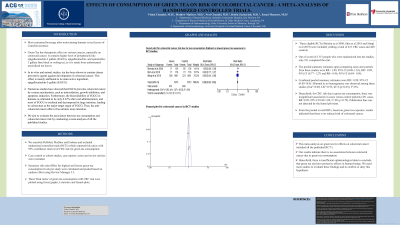Sunday Poster Session
Category: Colorectal Cancer Prevention
P0361 - Effect of Consumption of Green Tea on the Risk of Colorectal Cancer: A Meta-Analysis of Randomized Controlled Trials
Sunday, October 22, 2023
3:30 PM - 7:00 PM PT
Location: Exhibit Hall

Has Audio

Vishal Chandel, MD
Suburban Community Hospital
Feasterville-Trevose, PA
Presenting Author(s)
Vishal Chandel, MD1, Mathew Mathew, MD2, Neel Chandel, MD3, Robin Zachariah, MD4, Emad Mansoor, MD5
1Suburban Community Hospital, Feasterville-Trevose, PA; 2Suburban Community Hospital, Media, PA; 3St. Mary Medical Center, Feasterville-tTevose, PA; 4Duke University Hospital, Durham, NC; 5Case Western Reserve University / University Hospitals, Cleveland, OH
Introduction: Most consumed beverage after water among humans is tea (leaves of Camellia sinensis). Green Tea has therapeutic effect on various cancers, especially on colorectal cancer. It contains higher level of polyphenols like epigallocatechin-3 gallate (EGCG), epigallocatechin, and epicatechin-3 gallate than black or oolong tea, as it is made from unfermented unoxidized tea leaves. Annually, 52,580 Americans die of CRC, accounting for 8% of all cancer deaths. The pathogenesis and morbidity of colorectal cancer depends on a multitude of factors, with some evidence pointing to dietary habits. Our aim from this meta-analysis is to objectively evaluate whether this dietary intervention has any influence on the outcomes of colorectal cancer prevention.
Methods: We searched PubMed, Medline and Embase and included randomized controlled trials (RCTs) which reported risk ratios with 95% confidence interval of CRC risk for green tea consumption. Case control or cohort studies, case reports, series and review articles were excluded. Summary risk ratio (RRs) for highest and lowest green tea consumption levels per study were calculated and pooled based on random effect using Review Manager 5.3. These 'Risk ratios' of green tea consumption with CRC risk were plotted using forest graphs, I-statistics and funnel-plots.
Results: Three eligible RCTs (Shimitu et al 2008, Shin et al 2018 and Stingl et al 2019) were included yielding a total of 451 CRC cases and 460 controls. Out of a total of 1313 people who were randomized into the studies, only 911 completed the trial. The pooled summary estimates upon comparing cases and controls from these studies were RR= 1.09, 95% CI (0.86-1.39), RR= 0.99, 95% CI (0.77- 1.27) and RR= 0.96, 95% CI (0.84- 1.09). Combined pooled summary estimates were RR= 0.99, 95% CI (0.89-10.9). Minimal to no heterogeneity was observed among these studies (Tau2=0.00; Chi2=0.93, df=2 (p=0.63); I2=0%. Henceforth, for CRC risk due to green tea consumption, there was insignificant association in cases versus control patients (451 cases, RR=0.99, 95% CI 0.89-1.09, I2=0% p=0.79). Publication bias was not detected by the funnel plot tests.
Discussion: From the pooled overall RR’s, based on green tea exposure, results indicated that there is no reduced risk of colorectal cancer. Henceforth, there is insufficient epidemiological data to conclude that green tea can have protective effects in human-beings. We need more studies to evaluate these findings and to confirm or deny this hypothesis.

Disclosures:
Vishal Chandel, MD1, Mathew Mathew, MD2, Neel Chandel, MD3, Robin Zachariah, MD4, Emad Mansoor, MD5. P0361 - Effect of Consumption of Green Tea on the Risk of Colorectal Cancer: A Meta-Analysis of Randomized Controlled Trials, ACG 2023 Annual Scientific Meeting Abstracts. Vancouver, BC, Canada: American College of Gastroenterology.
1Suburban Community Hospital, Feasterville-Trevose, PA; 2Suburban Community Hospital, Media, PA; 3St. Mary Medical Center, Feasterville-tTevose, PA; 4Duke University Hospital, Durham, NC; 5Case Western Reserve University / University Hospitals, Cleveland, OH
Introduction: Most consumed beverage after water among humans is tea (leaves of Camellia sinensis). Green Tea has therapeutic effect on various cancers, especially on colorectal cancer. It contains higher level of polyphenols like epigallocatechin-3 gallate (EGCG), epigallocatechin, and epicatechin-3 gallate than black or oolong tea, as it is made from unfermented unoxidized tea leaves. Annually, 52,580 Americans die of CRC, accounting for 8% of all cancer deaths. The pathogenesis and morbidity of colorectal cancer depends on a multitude of factors, with some evidence pointing to dietary habits. Our aim from this meta-analysis is to objectively evaluate whether this dietary intervention has any influence on the outcomes of colorectal cancer prevention.
Methods: We searched PubMed, Medline and Embase and included randomized controlled trials (RCTs) which reported risk ratios with 95% confidence interval of CRC risk for green tea consumption. Case control or cohort studies, case reports, series and review articles were excluded. Summary risk ratio (RRs) for highest and lowest green tea consumption levels per study were calculated and pooled based on random effect using Review Manager 5.3. These 'Risk ratios' of green tea consumption with CRC risk were plotted using forest graphs, I-statistics and funnel-plots.
Results: Three eligible RCTs (Shimitu et al 2008, Shin et al 2018 and Stingl et al 2019) were included yielding a total of 451 CRC cases and 460 controls. Out of a total of 1313 people who were randomized into the studies, only 911 completed the trial. The pooled summary estimates upon comparing cases and controls from these studies were RR= 1.09, 95% CI (0.86-1.39), RR= 0.99, 95% CI (0.77- 1.27) and RR= 0.96, 95% CI (0.84- 1.09). Combined pooled summary estimates were RR= 0.99, 95% CI (0.89-10.9). Minimal to no heterogeneity was observed among these studies (Tau2=0.00; Chi2=0.93, df=2 (p=0.63); I2=0%. Henceforth, for CRC risk due to green tea consumption, there was insignificant association in cases versus control patients (451 cases, RR=0.99, 95% CI 0.89-1.09, I2=0% p=0.79). Publication bias was not detected by the funnel plot tests.
Discussion: From the pooled overall RR’s, based on green tea exposure, results indicated that there is no reduced risk of colorectal cancer. Henceforth, there is insufficient epidemiological data to conclude that green tea can have protective effects in human-beings. We need more studies to evaluate these findings and to confirm or deny this hypothesis.

Figure: Forest plot for colorectal cancer risk due to tea consumption (highest vs lowest green tea exposure in RCT studies AND Funnel plot for colorectal cancer in RCT studies
Disclosures:
Vishal Chandel indicated no relevant financial relationships.
Mathew Mathew indicated no relevant financial relationships.
Neel Chandel indicated no relevant financial relationships.
Robin Zachariah indicated no relevant financial relationships.
Emad Mansoor indicated no relevant financial relationships.
Vishal Chandel, MD1, Mathew Mathew, MD2, Neel Chandel, MD3, Robin Zachariah, MD4, Emad Mansoor, MD5. P0361 - Effect of Consumption of Green Tea on the Risk of Colorectal Cancer: A Meta-Analysis of Randomized Controlled Trials, ACG 2023 Annual Scientific Meeting Abstracts. Vancouver, BC, Canada: American College of Gastroenterology.
